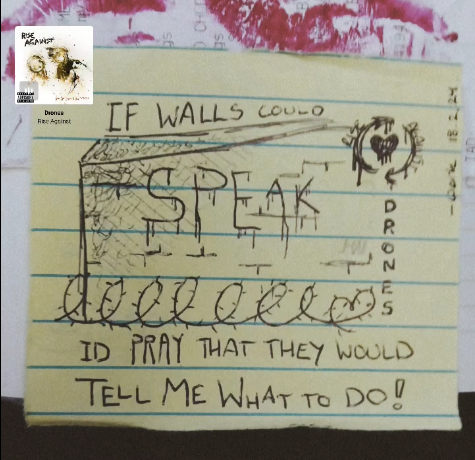Chamber the Cartridge

[27.04.25]; 6:01 PM
The Sufferer and the Witness begins with this song, Chamber the Cartridge, and opens with a sample from a train station that declares "This is Noyes" (not only a reference to their origins as a chicago-based band, but also a nod to their 2007 EP This is Noise).
the pre-chorus is a great subversion of the "carrying the weight of the world" idiom. because the song is about the environmental and political collapse of the world and the damage already caused, the lyrics say Blind to this impending fate / We'll let the world carry our weight / It's back breaks with every mile / But we all live in denial! and the chorus keeps this same energy by asking the listener rhetorical questions about whether "we" have gone too far (Can we be saved, has the damage all been done? / Is it too late to reverse what we've become?)
where the first verses are more to set the stage, the second is a bit more specific on the faliures of humanity. specifically the last two lines. "brushing past" a homeless vet on wall street, a single mom, and a TV personality. one after the other. their use of "brush past" is purposeful because it gives the sense of numbness that you can get living in the same conditions for so long.
Drones

[21.04.25]; 11:30 PM
arguably the best transition between two tracks on an album happens between Prayer of the Refugee and Drones— the ending guitar riff that slowly fades coupled with the compounding bass and drums overtop some guitar feedback —it's extremely catchy, obviously, but it's also an interesting choice. they're both songs of struggle: the former being about the struggle of immigration, and the latter being about the struggle of capitalistic monotony. so tying them together feels purposeful. these issues often come together in real life
Black Masks & Gasoline
[21.04.25]; 10:48 PM
Black Masks & Gasoline, to me, is the story of two people on the cusp of a revolution together; the "she" character, and the "i" character.
the chorus (and entire song) is spoken from the narrators point of view, and essentially asks the question "why do you care so much about the world if the world doesn't care about you?" this question echoes throughout the rest of the song. in the fourth verse, the narrator says One day I'll turn these thoughts into screams / At a world that turned its back down on me and in the first, the narrator says This life has taken its toll / She just doesn't know / How much more she can give.
each section of the song describes a different part of the narrative:
[Verse 1] an introduction to the characters
[Verse 2] an impending revolution that the narrator is figuratively on top of, in what i can only describe as an anarcho-daydream
[Chorus] the central theme
[Verse 3] similar to [Verse 2]
[Bridge] the climax of the song, a calling of revolution with imagery of violence and justice
[Verse 4] an introspection, and a sort-of opposite reaction than the [Bridge]. where the former is fueled by heart, the latter is fueled by head; as the narrator dreams of a better future
[Chorus] the central theme
there's a lot of talk of "we" and "us" and "our" throughout, and i think this could be interpreted in one of two ways: the narrator is, obviously, talking to us as the audience. but the narrator is also talking to this "she" character. an in this way, Black Masks & Gasoline is also a love story akin to Nineteen Eighty-Four. where two people can somehow find love in a world that keeps them under steel-toed boot.
and on that note... if you like that general vibe, i have a spotify playlists of songs just like this one.
